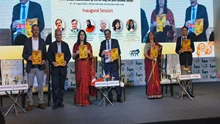
Ninjacart, India’s largest B2B fresh produce supply chain company furthered its vision of, ‘Safe food for billion people’ with its first set of Residue-Free Tomatoes, produced in partnership with agri-tech platform Kilofarms. This batch has been tested and cleared by Shiram Institute for Industrial Research, Bangalore, and also meets the 2013-14 National Bank for Agriculture and Rural Development (NABARD) testing list criteria in order to be safely tagged as residue-free consumable produce.
With a purpose to impact billions of their end consumers in meaningful ways, Ninjacart along with its associate partner Kilofarms, is optimistic in cultivating 8 more crops that will be residue-free including muskmelon, watermelon, chillies, potatoes, ridge gourd, ladies finger by February 2021, and 18 more crops by mid of next year.
Residue-free vegetables are grown with optimal farm inputs that do not contain any harmful chemicals and are not necessarily organic. Residue-free farming is safe, scalable, and affordable and has the potential to unlock safe food for billions of people. Residue-free vegetables and fruits are exported from India, but for local consumers, these methods were not being utilized to the fullest potential. While organic food production has been given more emphasis till now, the input costs are quite high and are not economical or scalable for farmers. Ninjacart and Kilofarms have leveraged each other's strengths to devise tech-enabled methods such as automated drip irrigation to assist farmers in achieving the finest grade of fresh produce through Residue-Free methods.
This technology will help farmers with moisture sensors that give a predictive estimate of the water content of the soil as it influences the yield of the crop. It helps reduce the amount of water used in the field by telling the farmers which part of the field has less water, thereby bringing more efficiency to the entire process with minimal wastage.
This entire system is controlled through an app wherein farmers can look after 30 to 40 acres of land in a single day, without having to spend the entire day in the field. Moreover, the production cost of this new method is almost at par with the conventional style of farming, where there is only a slight variation of Re. 1 per kg more, in average production cost in residue-free farming. The next step is to make residue-free farming scalable by the end of February 2021.
Thirukumaran Nagarajan, Co-founder and CEO, Ninjacart, while announcing the first set of successful residue-free vegetables, said, “ Ninjacart’s ambition since inception has been to ensure safe food for all, and with the introduction of our first residue-free produce we’ve come closer to that dream. We are extremely happy with what we’ve been able to accomplish and are excited to continue this journey with Kilofarms. Combining our knowledge of the supply chain ecosystem with their technology prowess, we will continue to stay steadfast in our goal and expand these methods to even more crops by next summer.”
Jerome Jesuraja Arokiasamy, Co-founder and CEO at KiloFarms said, “We are happy to have partnered with Ninjacart in their vision to ensure safe food to billions of people. Ninjacart’s experience and our tech enabled solution, together has helped us to produce the first residue-free batch of tomatoes. We are excited to replicate the solution for other fresh produce and normalise residue-free produce in the market and among consumers.”
Earlier this year, Ninjacart introduced FoodPrint, a complete food traceability infrastructure that captures the end-to-end footprint traceability of fruits and vegetables which moves from farm to home. FoodPrint traces the produce right from the farm with information related to the farmer, when it was harvested, the truck that carried the produce, the warehouse that processed it, the helper who handled the product at the warehouse, the retailer who brought the product, and how it was delivered at the consumer’s doorstep.









